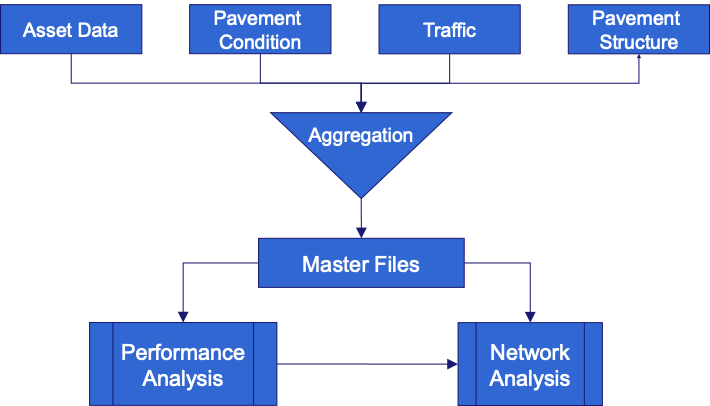System Basics
AgileAssets Pavement Analyst™ is a Pavement Management System (PMS) designed to help users manage the pavement network effectively. It stores, retrieves, and processes pavement-related condition and inventory data, allowing users to analyze the current condition, future performance, and expected financial needs of the network.
The system also allows the user to set up and use multiple analysis scenarios. Each scenario is a “what-if“ question that can find the optimal solution (work plan) for various funding and performance targets.
The system comes with the following 4 out-of-box datasets. Through configuration, these datasets can be expanded to include more data attributes, and more datasets can be added to meet the agency’s needs.
- Roadway Inventory: This is basic data about each section within the roadway system, such as functional classification, shoulder width, pavement type, number of lanes and lane width.
- Pavement Condition: This is the data that describe the condition of the road, usually coming from the Pavement Condition Survey.
- Traffic: This include the traffic volume of each road, usually collected at intersections and in the form of annual average daily traffic (AADT) and truck percentages.
- Pavement Structure (Construction History): These are the records of pavement structures and maintenance and rehabilitation histories. They define the pavement structures that exist on each pavement section. Using this information, the software can analyze performance and assign appropriate maintenance and rehabilitation treatments for planning and network analysis.
These datasets usually come from separate areas of the organization and are typically collected/measured using different criteria. For example, traffic data is usually collected/measured between major intersections (i.e., places where the traffic volume on a road is likely to change), whereas inventory data is collected on sections that are homogeneous with respect to the inventory data being measured, and pavement condition data may be collected at regular intervals (for example, one rating per mile for visual data).
A major component of the system is to provides methods for summarizing and aggregating these disparate data sources. This summarization/aggregation process produces “master files,” which serve as the basis for all data analysis within the system. The configuration will also produce the system routines and processes that allow the user to update these master files in an annual basis and be ready to run various optimization scenarios and reports.
Once the master files produced the system allows for two basic types of data analysis:
- Network Analysis: Used to develop an optimum construction/replacement, maintenance and rehabilitation strategy for the pavement network, which is the focus of this manual. This analysis uses Network Master Files.
- Performance Analysis: Used to develop the equations that predict the condition of all sections within the network. The equations can then be used as input to Network Analysis. Performance Analysis uses Performance Master Files.
This is a typical data flow within AgileAssets Pavement Analyst™ system.
For additional information, see the following topics:
